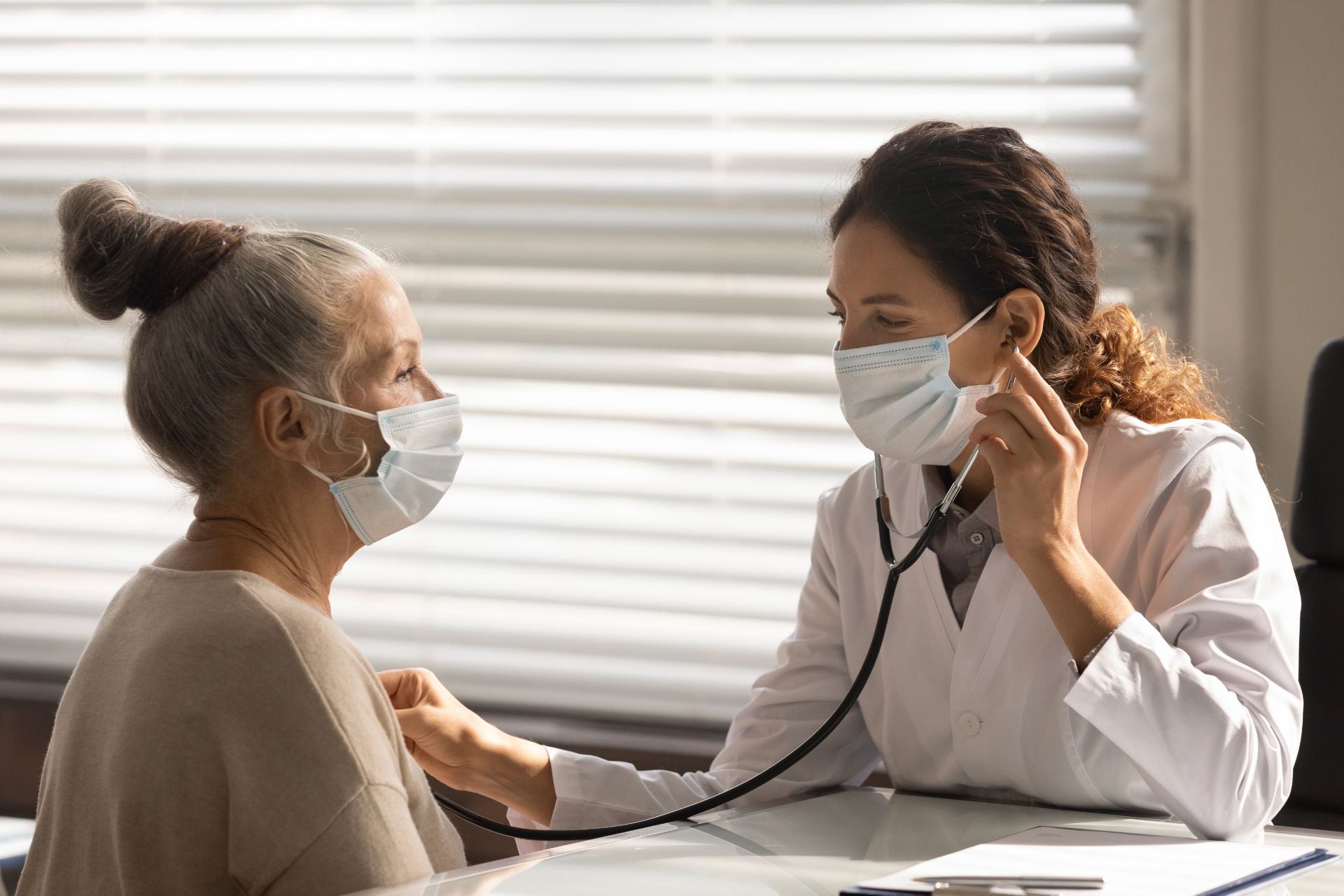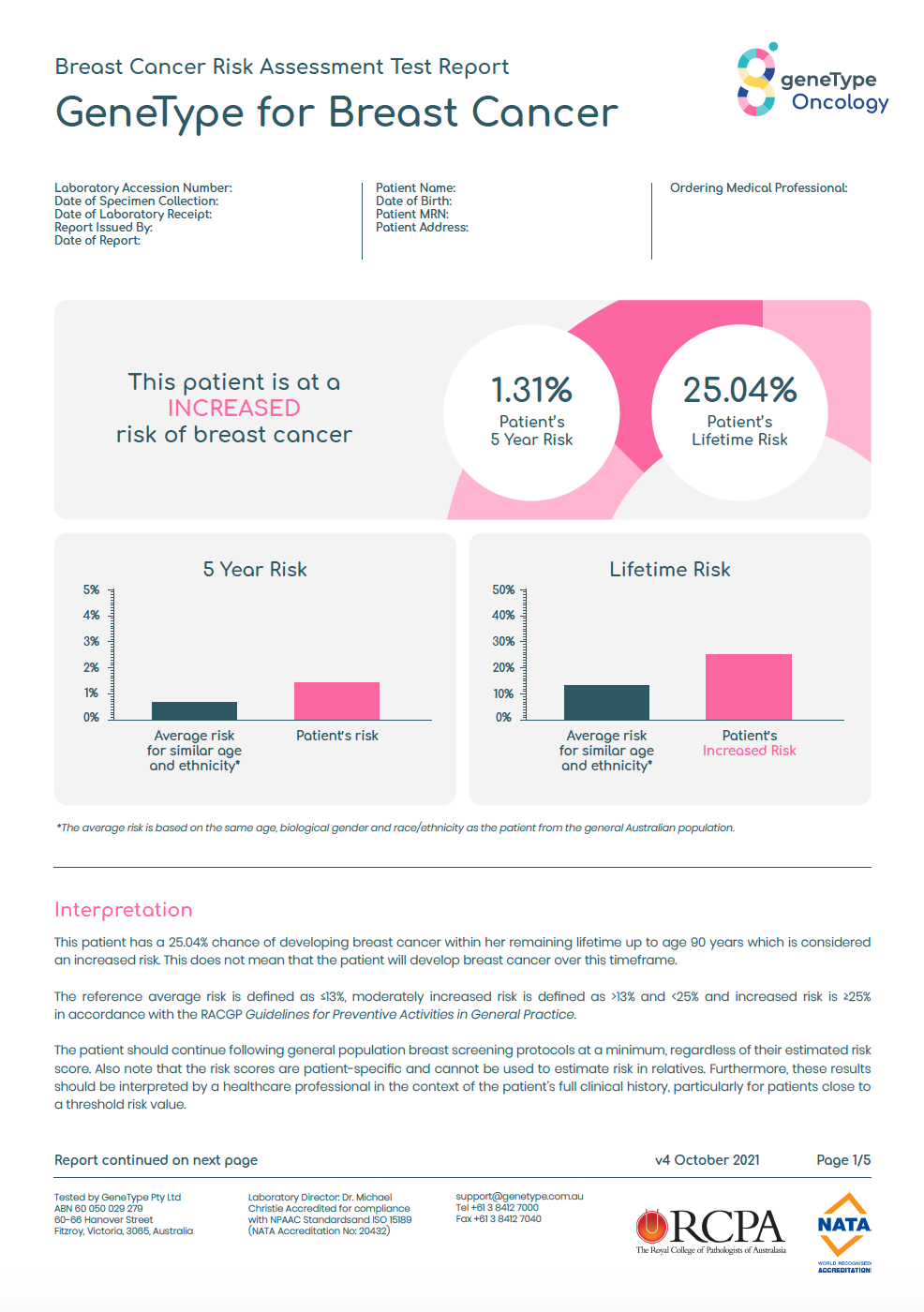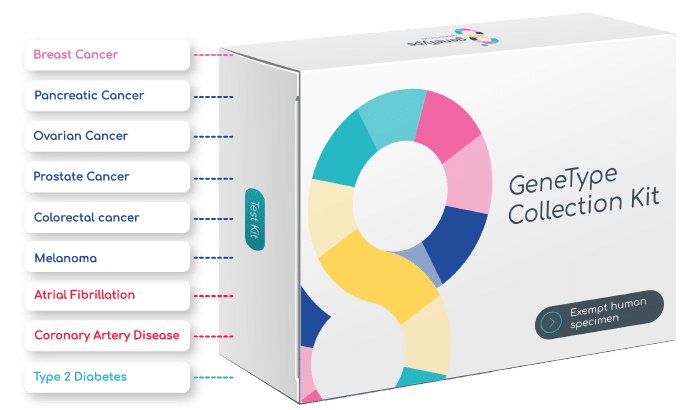What if you could more accurately predict her breast cancer risk?
The geneType for Breast Cancer risk score integrates broad genetic testing with traditional risk assessment modelling to provide a highly accurate personalised – and actionable – risk prediction.1,2


Identify your at-risk patients.
Women carrying a known hereditary breast or ovarian cancer (HBOC) gene variant (such as BRCA1 or BRCA2) are automatically categorised as high risk and should be referred to a specialist.
For most women who are negative for HBOC gene mutations,4 geneType for Breast Cancer integrates genetic, familial and clinical risk factors to provide an accurate personalised risk prediction over the next 5 years and in their lifetime.1,2
Firstly geneType for Breast Cancer tests for the BRCA1, BRCA2 and other HBOC genes. If positive, her results are sent directly to you as the requesting health professional. If her results are negative, geneType automatically reflexes to our integrated risk test that combines her clinical, familial and further genetics (70+ single nucleotide polymorphisms or SNPs) to calculate her 5-year and lifetime-risk scores.
Traditional prediction model + SNPs = significantly improved in risk stratification¹
Integrating the SNP-based score with clinical models yielded a >20%
improvement in breast cancer risk prediction as assessed using the AUC.¹
For all risk models tested, the combined risk score (model + SNP) resulted in a net improvement in risk stratification.¹

1 in 7 women will develop breast cancer.3 Most are BRCA1 and BRCA2 negative.4

Only 5% of breast cancer cases develop with a clear hereditary cause.4
An additional 10% of familial breast cancer have no known pathogenic variant.5
In the remaining 85% of cases (sporadic breast cancer), many common DNA variants (SNPs), familial factors and clinical factors may contribute a measurable effect on breast cancer risk.1,2
Testing is simple

Step 1
Register as a provider; our team will provide clinical education and other resources as needed.
We will send kits to your clinic to have on hand.

Step 2
Discuss geneType™ with your patient.
Would geneType™ help them qualify for additional risk reduction strategies?

Step 3
Complete the Test Requisition form, collect a sample from the patient in the buccal swabs provided and return both to geneType.
You will have the option to use a paper requisition, or a secure, compliant portal to complete the ordering process.

Step 4
Leave the rest to us.
We will notify you when your patient’s results are ready.
You will have the option to request a consult with a genetic counsellor, whether to review your patient’s results and/or to follow-up with your patient, as needed.

Integrating
breast density
A woman who has dense breast tissue, as identified by mammogram, is at higher risk of breast cancer. ⁶
GeneType for Breast Cancer utilises breast density, a significant risk factor for breast cancer, to give you one integrated risk score.⁶
One test report with actionable insights.
GeneType reports are structured to make the results easy to interpret and communicate to a patient. The geneType for Breast Cancer report includes:
- snapshot of your patient’s 5-year and lifetime-risk scores
- interpretation of what their risk scores mean in the context of your local guidelines
- polygenic risk score accounting for the additional ~300 SNPs that may influence their breast cancer risk
- information about managing breast cancer risk factors
- and the types of screening and interventions that may be relevant to her risk category
We have developed a Management Guide to help you understand how geneType results can help you apply your local guidelines and the types of screening measures, or risk-reducing strategies that are recommended for each risk catergory.
Sample patient report

Do your patients have questions? We have answers.
If we haven’t answered your question, contact us directly.
What will my GeneType for Breast Cancer results tell me?
Your results will tell you, based on genetics and other risk factors, your risk for developing sporadic breast cancer over two different time periods: in the next 5 years and in your lifetime. Your risk will be compared to the average risk for someone of your age and ethnicity. You and your healthcare provider can use this information to develop a personalized screening and risk reduction plan.
If I already get my regular mammogram, do I still need to know my Breast Cancer risk score?
Great work maintaining your routine mammogram screening! Your Breast Cancer risk score can help you and your healthcare provider develop a personalized screening plan for you, which may involve additional screening than just mammogram alone. How does GeneType for Breast Cancer assess my risk? GeneType for Breast Cancer combines several of your risk factors, such as age, family history, breast density, and your DNA markers, into one comprehensive risk assessment.
If I do not have an elevated risk on the test, does that mean I can skip my mammogram screenings?
No! Your GeneType for Breast Cancer results will indicate whether you are at increased risk, or average risk. If you are at average risk, it is still important to follow the recommended screening guidelines for women of your age.
What ethnicities are eligible for GeneType for Breast Cancer?
GeneType for Breast Cancer is available for women of all backgrounds. The risk model incorporates ethnicity-specific polygenic risk scores and ethnic-specific population incidence data derived from the Surveillance, Epidemiology, and End Results Program (SEER).
What do I do with my results?
If you ordered GeneType through your own healthcare provider, you will receive your results directly from him or her. If you ordered GeneType online, your Elicity or Phenix healthcare provider will notify you and discuss your results during a scheduled telehealth visit.
Will insurance cover this test?
This test is not generally covered by insurance. Your ordering healthcare provider will discuss the cost of the test with you. A credit card authorization form will be included in the test kit that list the payment options.
Are you ready to get started with geneType?
The first step is to trial geneType at your practice.

*Patient eligibility dependent on personal medical history, age and sex
Interested in ordering more than one disease? Order geneType™ Multi-Test.
The Multi-Risk suite of tests is for adults 40-85 years of age. At maximum, a woman would be eligible for eight diseases in the panel; a man would be eligible for seven. Starting at age 30, a patient may qualify for geneType's™ cancer risk assessments only.
The Multi-Risk suite of tests is for adults 40-85 years of age. At maximum, a woman would be eligible for 8 diseases in the panel; a man would be eligible for 7. Starting at age 30, a patient may qualify for geneType's cancer risk assessments only.
Blog posts
Start the conversation about Breast Cancer risk
Under the fluorescent lights of a doctor’s office, it’s not always easy to know what questions to ask. Here are some breast cancer risk questions…
Proactive steps for breast cancer risk reduction
Breast awareness is important whether you are 35 or 75. When you understand your risk, you can be a better advocate for yourself…
GeneType: A new era for Genetic Technologies
Genetic Technologies changed a lot in the last year. Our product innovations, expansion into new therapy areas and acquisitions…
References
- American Cancer Society. URL: https://www.cancer.org/cancer/breast-cancer/understanding-a-breast-cancer-diagnosis/breast-cancer-survival-rates.html
- van der Groep P et al. Cell Oncol (Dordr) 2011;34:71–88.
- Dite GS et al. Cancer Epidemiol Biomarkers Prev 2016;25:359–65.





